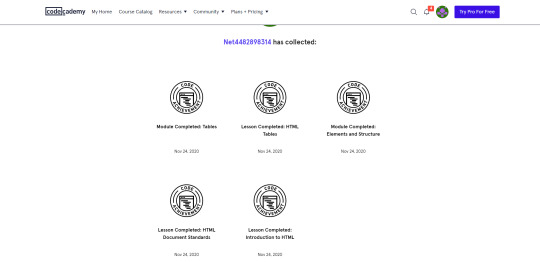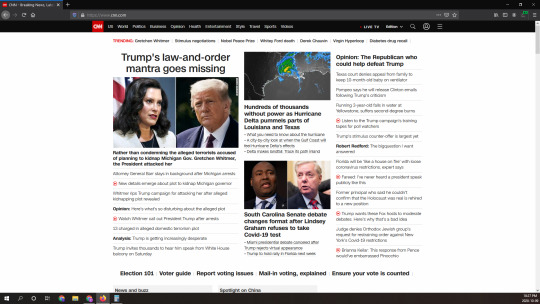Don't wanna be here? Send us removal request.
Photo

Infographic I made based on ‘Five Key Elements For A Big Analytics Driven Business Impact’ Occam’s Razer blog post.
kaushik.net/avinash/elements-for-big-digital-analytics-driven-business-success/
0 notes
Photo

Hey Everyone! Check out the HTML badges I earned from Codecademy!
0 notes
Link
PSA on Ethics of Photo Manipulation by Patrick, Hodan, and Ezi
0 notes
Photo

Wow! Over 80 tracking sites connected to CNN.com!
0 notes
Video
youtube
Hey Everyone! Check out this final project proposal by Ezi, Hodan and I.
0 notes
Text
How to Get the Best Out of Google: 10 Commonly Asked Questions About Search Optimization
*note: the only example that actually requires quotation marks is #1, the rest are only to distinguish when what to type.
1. How would you search for an exact word or phrase?
When searching for an exact word or phrase enclose the word or phrase in quotation marks. For example ’ “the exact word or phrase you wish to search” ‘.
2. How would you search for something on a specific site?
Type ‘site:websitename.com’ after the phrase you are searching the website for. For example if searching for information regarding rabbits on reddit.com type ‘rabbits site:reddit.com’.
3. How would you correctly search for a definition?
Type ‘define:’ before the word/term you are searching to define. For example if looking to define the word ‘transparent’ type ‘define: transparent’.
4. How would you search for a specific product available within a specific price range?
Type the name of the product you are looking for followed by ‘$minimum price..$maximum price’. For example if you are searching for an iPhone X between $300 and $600 you would type ‘iphone x $300..$600’
5. How would you search for a specific filetype?
To search for a specific filetype enter the word you wish to search followed by ‘filetype:---” (dashes represent the filetype letters). For example, if you were searching a map of Canada in pdf format you would type ‘map of Canada filetype:pdf’
6. How would you include or ignore words in your search?
To exclude words from your results type ‘-wordyouwishtoexclude’ after the phrase you wish to search. For example if searching the term ‘rolling stones’ but you do not want results to include the popular band of the same name, type ‘rollingstones -band’.
7. How would you find sites/pages similar to an existing one?
Type ‘related:’ before the website, for example ‘related:www.facebook.com’ when searching for sites/pages similar to facebook.
8. How would you confirm the exact form of a quote even if you were missing some of the words?
To confirm the exact form of a quote even if words are missing just enter the words you do know and put ‘*’ in the place of the words you do not. For example if you are searching the Simon and Garfunkle lyric “Hello darkness my old friend” but couldn't remember the entire line you could also type ‘* darkness my * friend’.
9. How would you search for pages containing two connected words?
To search for pages containing two connected words type a ‘+’ between the two words. For example ‘Simon+Garfunkle’.
10. How would you search for social media content containing a specific tag?
Type a ‘#’ before the specific tag you're looking for. For example #houstonasterisks.
0 notes
Text
Youtube: Interactivity and Narrowcasting
It's fair to say that the world probably wasn't prepared for Web 2.0. Within the first decade of the new millennium the Internet went from a complex digital bulletin board which average people barely understood to an essential extension of life. Websites like Myspace and Facebook developed on the existing concept of an internet forum which made interactivity the whole point of being on the internet. Youtube also launched around this time but was very reminiscent of the broadcasting formula of someone creating content and people consuming rather than the whole ecosystem of subscribers, comments and monetization that Youtube eventually developed.
Perhaps it is a ‘chicken or the egg’ situation where it is hard to determine if interactivity was necessary for Youtube to develop or did the popularization of the Youtube ecosystem lead to more interactivity on the internet? The answer is probably somewhere in the middle. As a direct result of creators being able to monetize their Youtube videos, thousands of full time Youtubers have emerged, most of whom create niche content made exclusively for a specific fanbase. This concept is known as ‘narrowcasting’ because it narrows the scope of traditional broadcasting. From podcasts to makeup tutorials they all have subscribers. These subscribers comment, buy advertised products, donate or even make their own videos in response to the original video, which eventually creates their own ecosystem. While many members of many Youtube ecosystems can be hateful or negative, (many creators will say they cannot even look at the comment section) the more creators on Youtube, the better. Better not only for the business of Youtube but for all creators and consumers as well because it inspired more content and interactivity. More Youtubers are obviously also better for Youtube which is why they launched the Youtube Creator Academy to help creators get started (linked below). If you are interested in becoming a Youtube creator, or even just curious, I encourage you to take a look.
YouTube Creator Academy
https://creatoracademy.youtube.com/page/home
1 note
·
View note